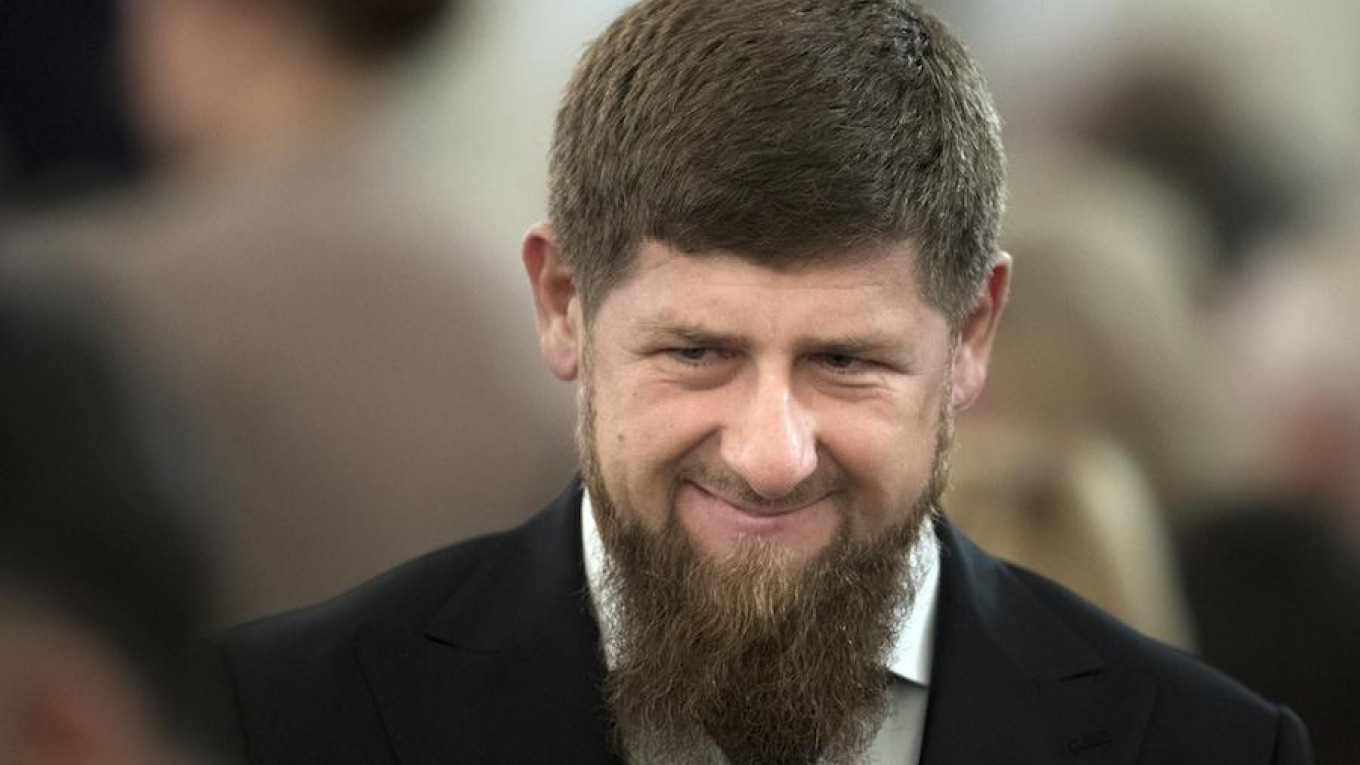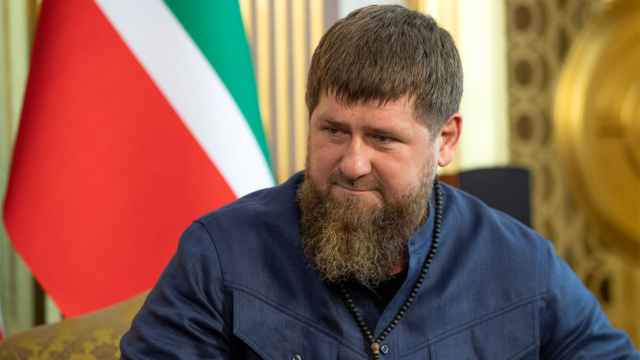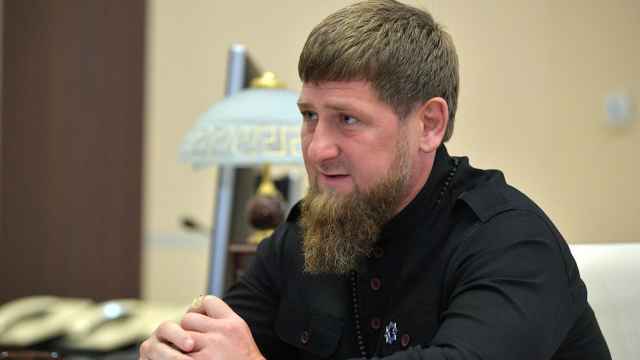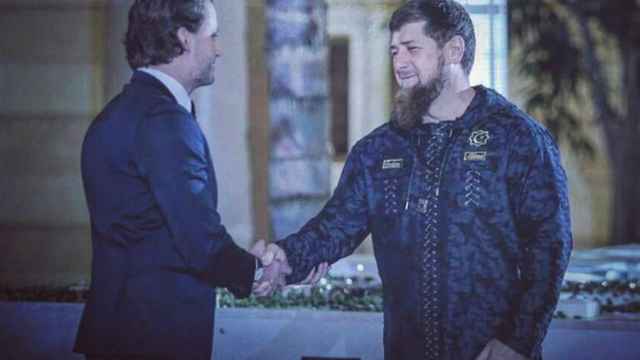"So have you made your choice?” the presenter asks.
“I made my choice right at the start. I just haven’t told anybody, not even my wife,” replies Chechen leader Ramzan Kadyrov.
Had they known, the 16 contestants of the Komanda (“Team”) reality TV show might have thought twice before competing in challenges such as boxing, firing crossbows and cooking the perfect shashlik — all in a bid to impress the warlord and be picked as his aide.
Some paid a high price for the honor. One female candidate fainted from physical exhaustion after running up a mountain and another participant quit his job to join the competition.
The show, which aired its final episode on the state-run television channel Rossia 1 on Nov. 23, was perhaps Kadyrov’s most crafted PR stunt to date. It is certainly the only time the reward involved a position in Kadyrov’s administration as “strategic development adviser.”
One TV critic described the show as “a gift to a man who has everything.” Others see it as part of a larger political strategy to prepare Kadyrov for a long-rumored promotion.
“Clearly work is being done on Kadyrov’s future at a national level,” says Grigory Shvedov, editor-in-chief of the Caucasian Knot online news portal. “It was meant to show that he is able to lead a team of people who are not from the Caucasus, with absolutely different backgrounds.”
In fact, at home Komanda might have ruffled a few feathers. The lavish palatial interiors that served as a backdrop to the show and the appearances by celebrities flown in from Moscow, are, after all, a far cry from the daily reality of most Chechens. “People are saying: do you know how much these celebrities get paid? My family can live off this money for a few years,” says Shvedov.
At times, the show’s aerial views of green mountains felt like they were taken out of a travel ad for a region which most Rus- sians still associate with war and insurgency. “Komanda show- cased the tourist potential of Chechnya,” says Shvedov. “Perhaps, the idea was to support existing attempts to attract federal funds in times of economic crisis.”
That the show did not have the predominantly Muslim Chechen audience in mind seems to be supported by Kadyrov’s final choice of Filipp Varychenko as his aide, a 24-year-old reportedly born in Germany and educated in the United States.
“He made his first money at the age of nine. Now he’s a millionaire and the manager of a successful German company. But he grew tired of European comfort,” the show summarized. Except for a website listing Varychenko as a member of a U.S.-based Russian Christians, his online footprint is practically non-existent. Presumably, Varychenko’s real CV was always secondary to his boyishly handsome fair looks and hooded Harvard-branded sweater that might as well have read “foreigner.”
A close ally of Putin’s, Kadyrov’s reputation took a hit early this year when he described critics of the Kremlin as “traitors” and posted a video on Instagram of a prominent politician in the crosshairs of a rifle.
For many Russians, Kadyrov’s brashness confirmed his reputation as the autocratic ruler of a backward region, from where reports frequently emerge of child weddings, abductions and torture. A poll by the independent Levada Center in late January showed Kadyrov’s approval ratings had fallen from 35 to 17 percent compared to the previous year.
Nevertheless, the Kremlin appears to have stuck by him, reappointing him as regional leader in May last year and allowing him to run in September’s controversial elections which he, unsurprisingly, won.
In return, Kadyrov professes loyalty to the Kremlin at every turn. “Being part of a team in today’s system is being part of the team of Vladimir Putin, for 100 percent,” he lectures, before sending a contestant packing.
Kadyrov presents the show as a fight against “stereotypes.” “We were called terrorists, separatists, extremists. But we’ve completely changed our views. We’re writing a new book.”
According to Tanya Lokshina of Human Rights Watch, however, the reality of life in Chechnya is far from a new book. “Kadyrov has been running Chechnya for almost a decade as his own fiefdom,” she says. “People who are even mildly critical are punished ruthlessly,” she says.
At least the story of Komanda has a happy end: the show concluded with the announcement that all six finalists were offered jobs in the Chechen government.
A Message from The Moscow Times:
Dear readers,
We are facing unprecedented challenges. Russia's Prosecutor General's Office has designated The Moscow Times as an "undesirable" organization, criminalizing our work and putting our staff at risk of prosecution. This follows our earlier unjust labeling as a "foreign agent."
These actions are direct attempts to silence independent journalism in Russia. The authorities claim our work "discredits the decisions of the Russian leadership." We see things differently: we strive to provide accurate, unbiased reporting on Russia.
We, the journalists of The Moscow Times, refuse to be silenced. But to continue our work, we need your help.
Your support, no matter how small, makes a world of difference. If you can, please support us monthly starting from just $2. It's quick to set up, and every contribution makes a significant impact.
By supporting The Moscow Times, you're defending open, independent journalism in the face of repression. Thank you for standing with us.
Remind me later.






